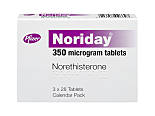Noriday
Take Noriday daily as an effective way to prevent pregnancy.




Noriday is an oral contraceptive pill you can take to prevent pregnancy. Noriday is known as a progesterone-only pill, or mini pill. Mini pills do not contain any oestrogen, so are an effective alternative to the combined contraceptive pill.
The active ingredient of Noriday is norethisterone, a type of progestogen hormone. Each Noriday tablet contains 350 micrograms of norethisterone.
Noriday is available in 2 different pack sizes that contain either 28 or 84 pills.
Simply complete our brief medical questionnaire, and a ZAVA doctor will then check to see if treatment is right for you. They will then issue your prescription to a local pharmacy in Ireland or choose to have your medication delivered directly to your door.



About Noriday
What is Noriday?
Noriday is an oral contraceptive pill. Oral contraceptives contain similar versions of female sex hormones that your body naturally produces. If you take Noriday at the same time every day, within the same 3 hour time slot, you can effectively prevent pregnancy.
As Noriday does not contain oestrogen, it can be suitable to take if you cannot take oestrogen for any reason. For example, as an alternative to the combined contraceptive pill. You should not take a 7 day pill break with progesterone-only pills like Noriday.
How to take Noriday
You should take Noriday at the same time each day, within the same 3 hour window. This includes when you have a period-like bleed.
Take 1 Noriday pill each day and swallow it with water. Choose a time that is convenient for you to take the pill and that will be easy to remember.
Take your first Noriday pill on the first day of your period. This is known as day 1 of your cycle. Continue taking Noriday once a day for as long as you wish to prevent pregnancy.
Each pack of Noriday is marked with the days of the week to help you keep track of your pills. When you have finished a pack, start a new pack on the next day so there are no breaks.
For the first 2 days of taking Noriday, you will not be fully protected against pregnancy unless you start at the beginning of your cycle. You should use extra contraception like condoms during this time.
What happens if you miss a pill?
If you miss a Noriday pill, take it as soon as you remember. If you are more than 3 hours late:
- take the missed pill as soon as you remember
- take the next pill at the normal time (this may mean that you take 2 pills on the same day)
- continue taking the pill every day as normal
- for the next 2 days, use a condom if you have sex
If you miss 1 Noriday pill or more and have had unprotected sex within the past 7 days, you may need emergency contraception, such as the morning after pill.
How does Noriday work?
Noriday works in a few ways to prevent you from becoming pregnant. The natural fluctuations of oestrogen and progesterone during your menstrual cycle control the environment of your womb. When you take Noriday every day, you’re taking a steady dose of synthetic progesterone. This stops the hormonal fluctuations and causes some changes such as:
- the mucus in your cervix thickening, making it harder for sperm to reach the womb
- the lining of your womb gets thinner, making it harder for a fertilised egg to implant
- the transport of your eggs from your ovaries through the fallopian tubes can be delayed
All of these actions stop you from getting pregnant and makes Noriday an effective form of contraception.
How effective is Noriday?
Noriday is 99% effective at preventing pregnancy when taken perfectly. This means that if 200 women took Noriday in a year, less than 2 women will get pregnant.
However, we are only human! Sometimes you might forget to take a pill now and then, which is known as typical use. With typical use, Noriday is 91% effective in preventing pregnancy.
Noriday has a much smaller time frame to take the pill in. Other mini pill contraceptives, such as Cerazette, can be taken within the same 12 hours each day to maintain effectiveness. However, Noriday needs to be taken within the same 3 hour window each day.
If you have diarrhoea or vomiting, Noriday may not be as effective. You should continue taking Noriday as normal and use condoms for 2 days after you get better.
Remember that Noriday does not protect you against sexually transmitted infections (STIs).
Side effects of Noriday
You may experience side effects with Noriday. These are usually mild and will get better over time.
Possible side effects of Noriday can include:
- an upset stomach
- weight changes
- breast tenderness
- headaches or migraines
- changes to your sex drive
- appetite changes
- a rash
- feeling tired
- mood changes like feeling nervous or depressed
- high blood pressure
- irregular periods
If you experience severe mood changes or feel suicidal after taking Noriday, speak to your doctor immediately.
Contraceptive pills can change your periods. You might find your periods becoming lighter or having longer cycles. You may also experience breakthrough bleeding, which is bleeding in between your periods. This is normal for the first few months of taking Noriday. If this is prolonged or persistent, speak to your doctor.
There is a small risk of developing a blood clot when taking oral contraceptives. Women have a slightly higher natural risk of developing blood clots than men. When you take a contraceptive pill, this risk increases only slightly.
If you experience any of the following side effects they might be the sign of a blood clot:
- sudden or severe chest pain
- shortness of breath
- unusual or severe headache
- changes to your vision
- severe pain, swelling or redness in one of your legs
- feeling numb or weak
You should stop taking Noriday and contact your emergency department immediately.
Like blood clots, women are also at risk of breast cancer as they get older. When taking the pill, your risk of breast cancer increases only slightly especially if you are over 40. You should check your breasts regularly and speak to your doctor if you notice anything unusual.
Before prescribing a contraceptive pill, your doctor may check your blood pressure or ask you to send a blood pressure reading to them. This is also done on an annual basis when your pill is reviewed. This is because some contraceptive pills can increase your risk of heart disease, which high blood pressure can indicate.
For more information on these side effects, you can read the patient information leaflet.
Who can take Noriday?
You can take Noriday if you are a woman and would like to prevent pregnancy.
You should not take Noriday if you:
- are allergic to norethisterone or any other ingredients in Noriday
- are pregnant or think you might be pregnant
- have heart disease or have had a stroke
- have liver disease
- have never had a period or have very infrequent periods
- have hormone dependent cancer such as breast cancer or cervical cancer
- have abnormal vaginal bleeding
If you become pregnant while taking Noriday, there is a slightly higher risk of having an ectopic pregnancy. An ectopic pregnancy occurs when the foetus develops outside the womb.
If you want to get pregnant and have stopped taking Noriday, wait until your periods have returned to normal before trying for a baby.
If you miss two periods in a row whilst taking Noriday, speak to your doctor immediately. You may need to take a pregnancy test.
You can take Noriday after having a miscarriage or an abortion.
Speak to your doctor before taking Noriday if you:
- are breastfeeding
- are over 35
- are obese
- have a history of pre-eclampsia during pregnancy
- smoke cigarettes
- have epilepsy
- have multiple sclerosis
- have otosclerosis (a form of deafness)
- have diabetes
- have gallstones
- have migraines
- have heart or kidney problems
- have depression
- have liver disease
- have varicose veins
- have high blood pressure
- have asthma
Noriday interactions
Some medicines can make Noriday less effective. Noriday can also interfere with how other medicines work.
Speak to your doctor or pharmacist if you are taking:
- epilepsy treatment such as carbamazepine, phenytoin, phenobarbital or topiramate
- HIV treatment such as nelfinavir, nevirapine and ritonavir
- certain antibiotics such as rifabutin, rifampicin, ampicillin and doxycycline
- griseofulvin for fungal infections
- modafinil used to treat narcolepsy
- St John’s wort, a herbal remedy used to treat low moods
- corticosteroids such as prednisolone
Your doctor may advise you to use extra contraception when taking Noriday or suggest a more suitable pill.
Alternative contraception
There are many oral contraceptives available which means there are plenty of options for you to try. If you want to keep taking a mini pill, you can try Cerazette.
If you can take oestrogen, you can try a combined pill. This includes Mercilon and Yasmin.
At ZAVA, we also offer a contraceptive patch called Evra. Evra patches contain a synthetic (man made) oestrogen and progesterone and you only need to change them once a week. This might be suitable if you forget to take your pill every day.
Other methods of contraception include having a hormonal coil or the copper IUD (intrauterine device) fitted. You can speak to your doctor or sexual health clinic about these options.

Babak studied medicine at King’s College London and graduated in 2003, having also gained a bachelor’s degree in Physiology during his time there. He completed his general practice (GP) training in East London, where he worked for a number of years as a partner at a large inner-city GP practice. He completed the Royal College of GPs membership exam in 2007.
Meet our doctorsLast reviewed: 07 Sep 2022
-
Noriday 350 micogram Patient Information Leaflet (PIL) [May 2019] [accessed Jan 2022]
